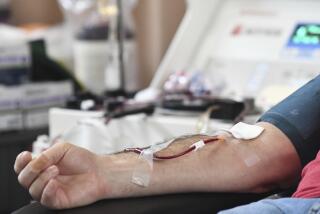Donating Blood
- Share via
When loss of blood results due to injury, surgery or medical treatment, we assume that hospitals will always have enough on hand to meet our needs. But will they? In spite of the fact that most healthy adults are good candidates for blood donation, fewer people who are able to give blood do so. The result is that blood shortages in various parts of the United States are becoming a chronic problem.
As a physician specializing in internal medicine, I can assure you, there is no risk of getting AIDS from giving blood. A new, sterile needle is used for each procedure. Once it is used, the needle is destroyed. It is, however, true that the donor pool--those able to give blood--is dwindling as more people are rejected because they may carry disease, making their blood unsuitable for transfusion. Other factors may also exclude potential donors from giving blood, such as recent major surgery; certain vaccinations; pregnancy or recent delivery; sore throat, fever or flu; cancers and other chronic illnesses.
Giving blood is painless and simple. To be eligible, you must be over 17, weigh over 100 pounds and be in good health. Age alone is not a restriction; older healthy adults should be encouraged to be donors. All donors must pass a confidential screening test, including a medical history, lifestyle questions and a basic physical exam (blood pressure, temperature, weight).
For all its wonders, medical technology has not replaced the need for blood. We are the only source. Each year, over 8 million volunteer blood donors give an estimated 12 million units of blood. These units are usually split into several parts or components to meet the urgent needs of many patients. For example, oxygen-carrying red cells may help a heart surgery patient recover, while platelets, which aid in blood clotting, might go to a child with leukemia.
It is interesting to note that, although donors give blood for free, the cost of recruiting donors, collecting, testing, labeling, storing, preparing blood components and delivering blood to hospitals is high. In addition to what the American Red Cross and other blood centers must charge for a unit of red blood cells, hospitals add their own processing charges.
For planned surgery, it is sometimes possible to donate your own blood ahead of time so that it will be available for your operation. But, in emergencies, there is no time to collect, test and process blood from family or friends. So, it is up to all of us to roll up our sleeves and spend an hour a few times a year doing something to ensure that America is a healthier place for all of us.
Make an appointment with your local blood center today. If you have questions, call the American Red Cross.
GLENN D. LITTENBERG MD
President-elect, California
Society of Internal Medicine
Pasadena






